高一 反义疑问句
高一反义疑问句练习题

5.Don’t smoke in the meeting room,?
6.His wife had the front door painted green yesterday,?
11.I’m sure that he will come to the party next Friday,?
12.Few people know him,?
13.He knows the player who has won four gold medals,?
14.You have a new bike,?
19.You haven’t finished your homework yet,?
20.They must finish the work today,?
答案:
1.shall we
2.will you
3.didn’t he
4.didn’t it
5.will you
6.didn’t she
7.don’t we
7.When the teacher speaks,we have to keep quiet,?
8.He never told us why he was late,?
9.there is little point in doing anything about it,?
10.One can’t be too modest,?
高一反义疑问句练习题
1.It’s a fine day. Let’s go fishing,?
2.If you want heБайду номын сангаасp—money or anything,let me know,?
高中英语反义疑问句
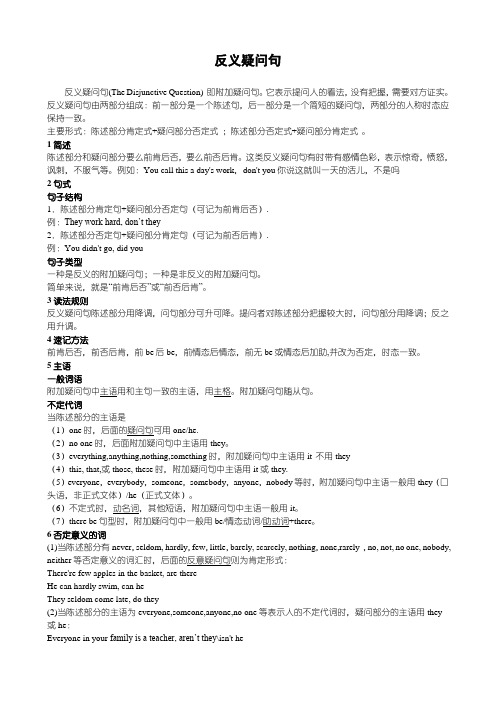
反义疑问句反义疑问句(The Disjunctive Question) 即附加疑问句。
它表示提问人的看法,没有把握,需要对方证实。
反义疑问句由两部分组成:前一部分是一个陈述句,后一部分是一个简短的疑问句,两部分的人称时态应保持一致。
主要形式:陈述部分肯定式+疑问部分否定式;陈述部分否定式+疑问部分肯定式。
1简述陈述部分和疑问部分要么前肯后否,要么前否后肯。
这类反义疑问句有时带有感情色彩,表示惊奇,愤怒,讽刺,不服气等。
例如:You call this a day's work,don't you你说这就叫一天的活儿,不是吗2句式句子结构1.陈述部分肯定句+疑问部分否定句(可记为前肯后否).例:They work hard, don’t they2.陈述部分否定句+疑问部分肯定句(可记为前否后肯).例:You didn't go, did you句子类型一种是反义的附加疑问句;一种是非反义的附加疑问句。
简单来说,就是“前肯后否”或“前否后肯”。
3读法规则反义疑问句陈述部分用降调,问句部分可升可降。
提问者对陈述部分把握较大时,问句部分用降调;反之用升调。
4速记方法前肯后否,前否后肯,前be后be,前情态后情态,前无be或情态后加助,并改为否定,时态一致。
5主语一般词语附加疑问句中主语用和主句一致的主语,用主格。
附加疑问句随从句。
不定代词当陈述部分的主语是(1)one时,后面的疑问句可用one/he.(2)no one时,后面附加疑问句中主语用they。
(3)everything,anything,nothing,something时,附加疑问句中主语用it 不用they(4)this, that,或those, these时,附加疑问句中主语用it或they.(5)everyone,everybody,someone,somebody,anyone,nobody等时,附加疑问句中主语一般用they(口头语,非正式文体)/he(正式文体)。
(完整word版)高中反义疑问句
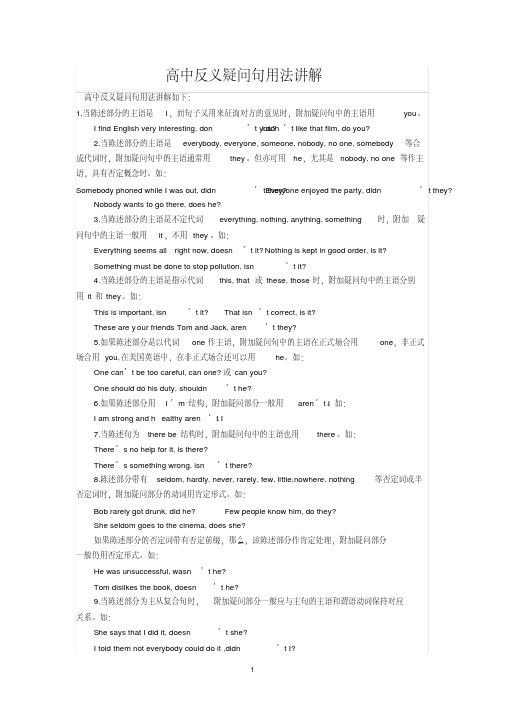
高中反义疑问句用法讲解高中反义疑问句用法讲解如下:1.当陈述部分的主语是I,而句子又用来征询对方的意见时,附加疑问句中的主语用you。
I don’t like that film, do you?I find English very interesting, don’t you?2.当陈述部分的主语是everybody, everyone, someone, nobody, no one, somebody等合成代词时,附加疑问句中的主语通常用they。
但亦可用he,尤其是nobody, no one等作主语,具有否定概念时。
如:Everyone enjoyed the party, didn’t they? Somebody phoned while I was out, didn’t they?Nobody wants to go there, does he?3.当陈述部分的主语是不定代词everything, nothing, anything, something时,附加疑问句中的主语一般用it,不用they。
如:Everything seems all right now, doesn’t it?Nothing is kept in good order, is it?Something must be done to stop pollution, isn’t it?4.当陈述部分的主语是指示代词this, that或these, those时,附加疑问句中的主语分别用it和they。
如:This is important, isn’t it?That isn’t correct, is it?These are y our friends Tom and Jack, aren’t they?5.如果陈述部分是以代词one作主语,附加疑问句中的主语在正式场合用one,非正式场合用you,在美国英语中,在非正式场合还可以用he。
反义疑问句例句20个
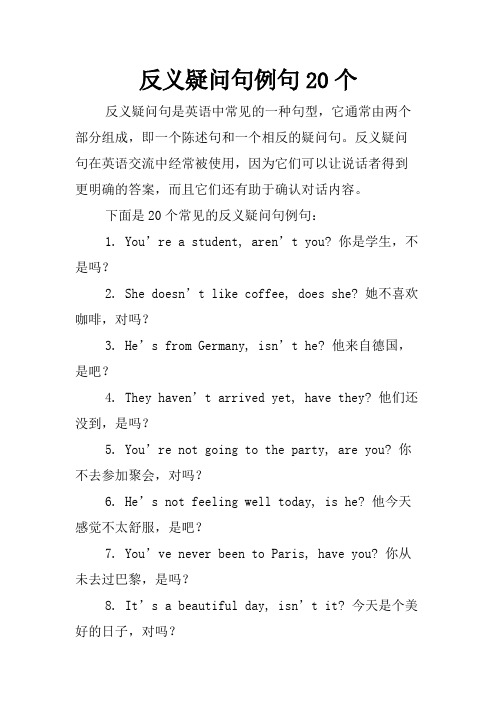
反义疑问句例句20个反义疑问句是英语中常见的一种句型,它通常由两个部分组成,即一个陈述句和一个相反的疑问句。
反义疑问句在英语交流中经常被使用,因为它们可以让说话者得到更明确的答案,而且它们还有助于确认对话内容。
下面是20个常见的反义疑问句例句:1. You’re a student, aren’t you? 你是学生,不是吗?2. She doesn’t like coffee, does she? 她不喜欢咖啡,对吗?3. He’s from Germany, isn’t he? 他来自德国,是吧?4. They haven’t arrived yet, have they? 他们还没到,是吗?5. You’re not going to the party, are you? 你不去参加聚会,对吗?6. He’s not feeling well today, is he? 他今天感觉不太舒服,是吧?7. You’ve never been to Paris, have you? 你从未去过巴黎,是吗?8. It’s a beautiful day, isn’t it? 今天是个美好的日子,对吗?9. He can’t swim, can he? 他不会游泳,对吗?10. She doesn’t like pizza, does she? 她不喜欢披萨,对吗?11. You’re not afraid of heights, are you? 你不怕高,对吗?12. They won’t be able to attend the meeting, will they? 他们不能参加会议,对吗?13. They’re leaving tomorrow, aren’t they? 他们明天要走了,对吗?14. He’s never been skiing, has he? 他从未滑过雪,对吗?15. She’s not going to the concert, is she? 她不去音乐会,对吗?16. You’re not worried about the exam, are you? 你不担心考试吧,对吗?17. He didn’t eat breakfast this morning, did he? 他今天早上没吃早餐,对吗?18. They’r e not going to the beach, are they? 他们不去海边,对吗?19. You’ve already seen the movie, haven’t you? 你已经看过这部电影了,对吗?20. He’s not coming to the party, is he? 他不来参加聚会,对吗?在使用反义疑问句时,需要注意的是,它们并不总是表示对话者的不确定或疑虑。
高中英语语法_反意疑问句

(一)特殊情况 (1)陈述部分是I am 时,疑问部分常用 “aren't I?”代替更正式的“am I not? ”。 如: I'm late, aren't I? 我迟到了,是 吗? (2)如陈述部分是“there be”结构时,疑 问部分只需对换there be 的位置即可。如: There's something wrong with your watch, isn't there? 你的手表有毛病,对吗?
但疑问部分仍要用否定式。如:
She dislike it, doesn't she? 她不喜欢它,是吧?
(5)当 neither…nor, both…and 连接陈述 部分的两个主语时,疑问部分的主语常用 复数代词。如:
Both you and I are not wrong, are we? 你和我都不错,是吗?
5.牢记反意疑问句及答语的肯定,否定关系 的一般规则(“+”表示肯定,“—”表示否 定): 问句中:“+,—”或“—,+”。 答句 中:“+,+”或“—,—”。 问中:He doesn't want to buy it, does he? 他不想买它,对吗? 答中:A:Yes, he does. 不,他想买。 B: No, he doesn't. 对,他不想买。
(二)当陈述部分主句的主、谓是 I (We) think(believe, imagine, expect, feel 等)加 that 引导的宾语从句时,疑问部分的主语 (代词)和动词要与从句的一致。如:
I think there is something wrong with the washer, isn't there? 我想洗衣机出了毛病, 对不对?
反义疑问句知识点
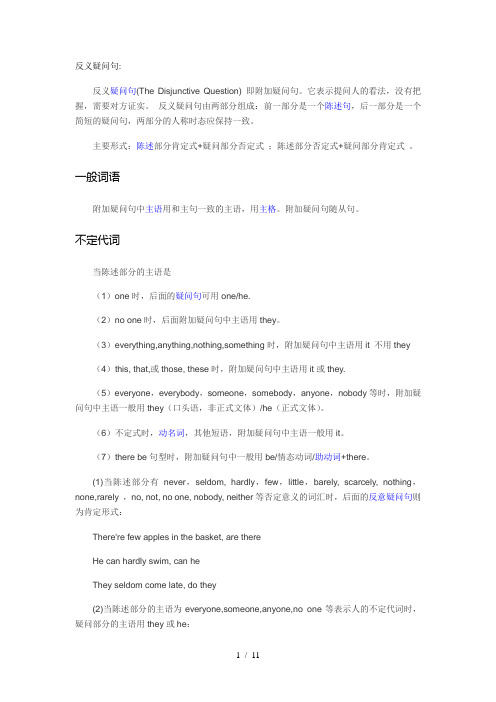
反义疑问句:反义疑问句(The Disjunctive Question) 即附加疑问句。
它表示提问人的看法,没有把握,需要对方证实。
反义疑问句由两部分组成:前一部分是一个陈述句,后一部分是一个简短的疑问句,两部分的人称时态应保持一致。
主要形式:陈述部分肯定式+疑问部分否定式;陈述部分否定式+疑问部分肯定式。
一般词语附加疑问句中主语用和主句一致的主语,用主格。
附加疑问句随从句。
不定代词当陈述部分的主语是(1)one时,后面的疑问句可用one/he.(2)no one时,后面附加疑问句中主语用they。
(3)everything,anything,nothing,something时,附加疑问句中主语用it 不用they(4)this, that,或those, these时,附加疑问句中主语用it或they.(5)everyone,everybody,someone,somebody,anyone,nobody等时,附加疑问句中主语一般用they(口头语,非正式文体)/he(正式文体)。
(6)不定式时,动名词,其他短语,附加疑问句中主语一般用it。
(7)there be句型时,附加疑问句中一般用be/情态动词/助动词+there。
(1)当陈述部分有never,seldom, hardly,few,little,barely, scarcely, nothing,none,rarely ,no, not, no one, nobody, neither等否定意义的词汇时,后面的反意疑问句则为肯定形式:There're few apples in the basket, are thereHe can hardly swim, can heThey seldom come late, do they(2)当陈述部分的主语为everyone,someone,anyone,no one等表示人的不定代词时,疑问部分的主语用they或he:Everyone in your family is a teacher, aren’t they\isn't he?(3)当陈述部分的主语为everything,something,anything.nothing等表示物的不定代词时,疑问部分的主语用it:Something is wrong with your watch, isn’t it(4)当陈述部分含有否定意思的词是unhappy,dislike,unfriendly,等含有否定词缀的派生词,也就是有un,dis,no-前缀、-less后缀等含有词缀而意思否定的词,当做肯定句处理,疑问部分要用否定形式。
高一英语反义疑问句

I. 讲解反意疑问句是一种礼貌用语,常用在闲聊中,说话人对自己的陈述还没有十分的把握,需要征求对方的同意或肯定,印证所陈述之事。
它是英语中的四大问句之一。
反意疑问句的种类和结构反意疑问句是由一个陈述句加上一个短问句而构成的,其疑问部分的动词与陈述部分的动词在语气上成相反的对应关系,其基本句子结构有以下两种:1. 肯定陈述句+简略否定问句,即:前肯后否。
如:It’s very hot today, ________________?2. 否定陈述句+简略肯定问句,即:前否后肯。
如:Bill didn’t want to go, ________________?反意疑问句构成上的几条原则1. 简略问句中的be动词、情态动词或助动词在人称、数及时态上,应和陈述部分相一致。
①陈述部分为be (充当系动词或助动词)时,简略问句中用相应形式的be (am, is are, was, were)。
如:I’m not late, ________________?They’re playing soccer on the playground, ________________?②陈述部分含有情态动词或者助动词时,简略疑问部分该情态动词或助动词的相应形式。
如:You could swim five years ago, ________________?He has been learning English for four years, ________________?We don’t go to work on Sundays, ________________?③陈述部分没有be动词、情态动词或者助动词时,简略疑问部分须依据人称、数以及时态而使用助动词do, does或者did。
如:Neither of them complained, ________________?You always stay up late every night, ________________?This picture looks very nice, ________________?2. 简略否定问句中的not一般要和be、情、助等加以缩略。
Unit 3 语法反义疑问句练习高一英语(人教版2019必修第一册)

Unit 3 语法反义疑问句练习高一英语(人教版2019必修第一册)反义疑问句即附加疑问句。
它表示提问人的看法,没有把握,需要对方证实。
它表示提问人的看法,没有把握,需要对方证实。
反义疑问句由两部分组成:前一部分是一个陈述句,后一部分是一个简短的疑问句,两部分的人称时态应保持一致。
1、陈述部分肯定式+疑问部分否定式2、陈述部分否定式+疑问部分肯定式They work hare, don’t they?She was ill yesterday, wasn’t she?You didn’t go, did you?He can’t ride a bike, can he?请注意以下句型的反义疑问句的用法:1、当陈述部分的主语是I , everyone, everything, nobody 时,后面的疑问句应表示为: I am a student, aren’t IEveryone is in the classroom, aren’t they?Everything begins to grow in spring, doesn’t it?Nobody will go, will they?2. 当陈述部分有never,seldom, hardly,few,little,barely, scarcely, nothing 等否定词时,后面的疑问句则表示为:There are few apples in the basket, are there?He can hardly swim, can he?They seldom come late, do they?3. 当陈述部分是I think 加从句时,疑问句应和从句的人称时态保持一致。
I think chickens can swim, can’t they?I think Lucy is a good girl, isn’t she?I didn’t think he was happy, was he?4. 陈述部分有had better 时,疑问句应用hadn’t开头:you’d better get up early, hadn’t you?5.当陈述部分是祈使句时,疑问句要根据语气来表达Let’s go out for a walk, shall we?Let us go our for a walk, will you? Turn on the radio, will you?6.反义疑问句的回答用yes, no,但是,当陈述部分是否定形式时,回答要按事实。
高一英语语法--反意疑问句

高一英语语法——反意疑问句赵金芬石娟罗晓红一、基本用法与结构反意疑问句由“陈述句+简单疑问句”两部分组成,第一部分提出一种看法,第二部分用来质疑或表示证实。
陈述部分与疑问部分的动词时态和动词性质应保持一致,而且肯定和否定形式彼此相反,即陈述部分为肯定式时,疑问部分用否定式,陈述部分为否定式时,疑问部分用肯定式:He likes English, doesn’t he? 他喜欢英语,不是吗?He doesn’t like English, does he? 他不喜欢英语,是吗?二、反意疑问句的用法:注意:1.当陈述部分带有否定前缀或后缀的否定词,如dislike, unfair, careless时,作肯定句处理,疑问部分用否定形式。
eg: She dislikes the novel, doesn't she?It's unfair, isn't it?2、当陈述部分的have/has不表示“有”,而表示“进行”、“举行”等,如:have breakfast / lunch, have a meeting,have a talk,疑问部分要用do/does/did,不用have/has/hadeg: They had a good time last night, didn't they?3、当陈述部分中的have/has/had to do sth.表示“不得不做...”时,疑问部分用don’t/doesn’t /didn’t。
eg: She has to stay at home to look after her sick mother, doesn't she?4、当陈述部分含有状语从句时,疑问部分的主语应和主句的主语一致。
eg: When you arrived at the station, the train had left, hadn't it?The train had left, when you arrived at the station, hadn't it?5、当陈述部分是并列(常用并列连词:so, and, but, or, for)反意部分和第二个分句一致eg: Mary is a good student, but she often comes to school late, doesn't she?6、当陈述部分的主语是one时,反意部分的主语也用one或he。
高中英语反意疑问句的用法大全

高中英语反意疑问句的用法一、英文中的反意疑问句1、反意疑问句的定义:英语中,反意疑问句是由陈述句和附在其后的附加疑问句(又称反意部分)组成。
其中附加疑问句是对陈述句所说的事实或观点提出相反的疑问,起证实作用,一般用于证实说话者所说的事实或观点。
翻译为“是吗”2.反意疑问句的构成:陈述部分+附加疑问部分(陈述句+反意问句)3.反意疑问句的回答,回答时,如果情况属实,用Y es加上反问句的倒装肯定句;若果情况不属实,则用No加上反问句的倒装否定句。
即肯肯或否否。
例如:Y ou were moved by your students, weren’t you?情况属实:Y es, I were.情况不属实:No, I weren’t.He doesn’t say very much,does he?Y es,he does.(是的,他没有。
)No,he doesn’t. (不,他说了很多。
)二、反意疑问句中疑问部分的动词与陈述部分的动词在语气上成相反的对应关系,即:肯定+否定?否定+肯定?如:①Y ou can’t do it, can you? 你不能做它,是吗?②They are very late for the meeting, aren’t they? 他们开会迟到了,是吗?三.当陈述句中含有be动词,助动词,或是情态动词时,反问句部分由这些词加上主语人称代词构成,Be动词包括:am, is(was), are(were)助动词有:do(does, did),have/has(用在完成时)等情态动词有:can, could, may, might, must, will, would, shall, should四.反意部分特殊用法1.当陈述部分的主语是I,而句子又用来征询对方的意见时,附加疑问句中的主语用you。
如: I find English very interesting, don’t you?I don’t like that film, do you?2.当陈述部分的主语是everybody, everyone, somebody,someone, nobody, no one,等合成代词时,附加疑问句中的主语通常用they。
高一英语疑问句反义疑问句试题答案及解析

高一英语疑问句反义疑问句试题答案及解析1.She doesn’t suppose the prices will go down this week, _______?A.does she B.doesn’t she C.won’t they D.will they【答案】A【解析】考查反意问句:句意:她不认为这个星期价格会下降。
主句的主语不是第一人称的时候,反意问句和主句一致,因为前面是否定,所以反意问句是肯定形式,选A。
【考点】考查反意问句2. You must have missed the first train yesterday, ________ you?A.weren’t B.didn’t C.mustn’t D.haven’t【答案】B【解析】陈述句部分是含有“must表示推测”的句子,该句是对过去发生的事所进行的推测,反意疑问句应该用一般过去时。
故选B项。
该句所说的实质就是:You missed the first train.句意:你昨天肯定错过了头班火车,是吗?【考点】反意疑问句3.—The spacecraft has never been to the moon, ________ ?—Certainly.A.has it B.hasn’t it C.doesn’t it D.isn’t it【答案】A【解析】考查反意问句:句意:--宇宙飞船从没去过月球,是吗?--当然。
前面的句子是现在完成式,反意问句用现在完成时,前面有否定词never,所以反意问句用肯定,选A。
【考点】考查反意问句4.I don’t believe that he will marry Kathy whom he doesn’t love at all,________?A.do I B.don’t I C.will he D.won’t he【答案】C【解析】考查否定前移的用法。
句意:我相信他不会和他一点不爱的Kathy结婚,句中I don’t believe 中的否定实际上是否定宾语从句,且以I/We think/suppose/believe 等开头的句子的反意疑问部分应与宾语从句保持一致。
反义疑问句(含解析、例句及详尽用法)
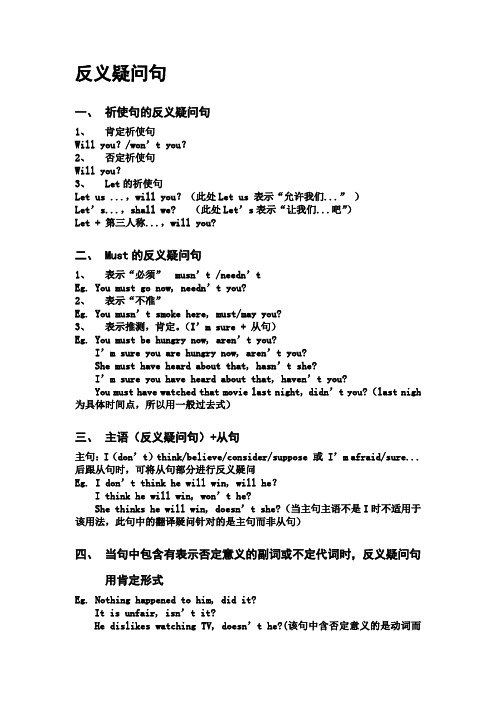
反义疑问句一、祈使句的反义疑问句1、肯定祈使句Will you?/won’t you?2、否定祈使句Will you?3、Let的祈使句Let us ...,will you?(此处Let us 表示“允许我们...”)Let’s...,shall we? (此处Let’s表示“让我们...吧”)Let + 第三人称...,will you?二、Must的反义疑问句1、表示“必须” musn’t /needn’tEg. You must go now, needn’t you?2、表示“不准”Eg. You musn’t smoke here, must/may you?3、表示推测,肯定。
(I’m sure + 从句)Eg. You must be hungry now, aren’t you?I’m sure you are hungry now, aren’t you?She must have heard about that, hasn’t she?I’m sure you have heard about that, haven’t you?You must have watched that movie last night, didn’t you?(last nigh 为具体时间点,所以用一般过去式)三、主语(反义疑问句)+从句主句:I(don’t)think/believe/consider/suppose 或 I’m afraid/sure...后跟从句时,可将从句部分进行反义疑问Eg. I don’t think he will win, will he?I think he will win, won’t he?She thinks he will win, doesn’t she?(当主句主语不是I时不适用于该用法,此句中的翻译疑问针对的是主句而非从句)四、当句中包含有表示否定意义的副词或不定代词时,反义疑问句用肯定形式Eg. Nothing happened to him, did it?It is unfair, isn’t it?He dislikes watching TV, doesn’t he?(该句中含否定意义的是动词而非副词或不定代词,因此不适用于该用法,反义疑问句仍然使用否定形式)五、反义疑问句的回答反义疑问句的回答针对被提问部分的谓语动词,且与回答句前部分的Yes和No 保持一致Eg. A: You haven’t lost the ticket, have you?B: D I know it’s hard to get another one at this moment.A. Yes, I haven’tB. No, I haveC. I hope soD. I’m afraid not六、陈述部分的主语与反义疑问句主语保持一致的情况1、OneEg. One can’t be too careful when driving a car, can one/he?一个人在开车的时候再怎么小心也不为过。
高中英语反义疑问句用法归纳
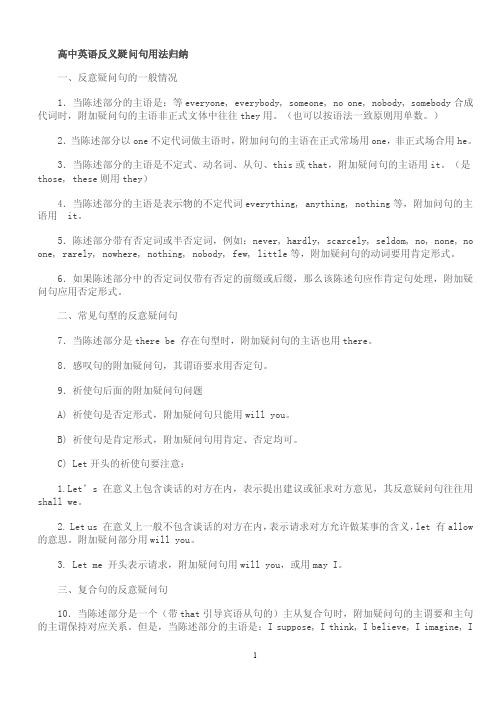
高中英语反义疑问句用法归纳一、反意疑问句的一般情况1.当陈述部分的主语是:等everyone, everybody, someone, no one, nobody, somebody合成代词时,附加疑问句的主语非正式文体中往往they用。
(也可以按语法一致原则用单数。
)2.当陈述部分以one不定代词做主语时,附加问句的主语在正式常场用one,非正式场合用he。
3.当陈述部分的主语是不定式、动名词、从句、this或that,附加疑问句的主语用it。
(是those, these则用they)4.当陈述部分的主语是表示物的不定代词everything, anything, nothing等,附加问句的主语用it。
5.陈述部分带有否定词或半否定词,例如:never, hardly, scarcely, seldom, no, none, no one, rarely, nowhere, nothing, nobody, few, little等,附加疑问句的动词要用肯定形式。
6.如果陈述部分中的否定词仅带有否定的前缀或后缀,那么该陈述句应作肯定句处理,附加疑问句应用否定形式。
二、常见句型的反意疑问句7.当陈述部分是there be 存在句型时,附加疑问句的主语也用there。
8.感叹句的附加疑问句,其谓语要求用否定句。
9.祈使句后面的附加疑问句问题A) 祈使句是否定形式,附加疑问句只能用will you。
B) 祈使句是肯定形式,附加疑问句用肯定、否定均可。
C) Let开头的祈使句要注意:1.Let’s 在意义上包含谈话的对方在内,表示提出建议或征求对方意见,其反意疑问句往往用shall we。
2. Let us 在意义上一般不包含谈话的对方在内,表示请求对方允许做某事的含义,let 有allow 的意思。
附加疑问部分用will you。
3. Let me 开头表示请求,附加疑问句用will you,或用may I。
高一英语疑问句反义疑问句试题答案及解析
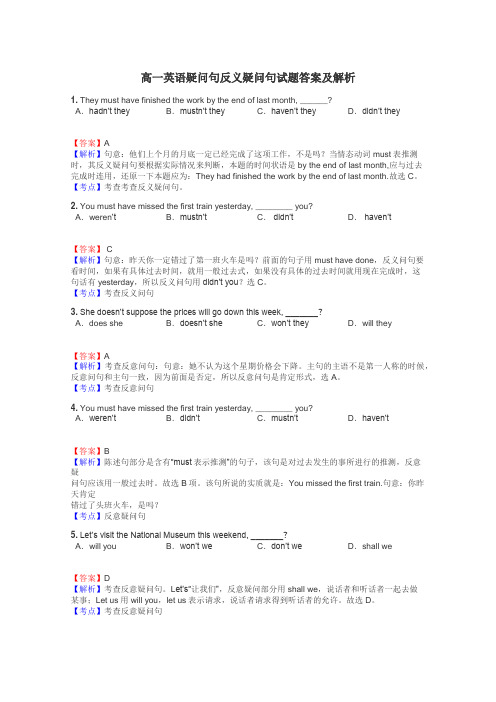
高一英语疑问句反义疑问句试题答案及解析1. They must have finished the work by the end of last month, ______?A.hadn’t they B.mustn’t they C.haven’t they D.didn’t they【答案】A【解析】句意:他们上个月的月底一定已经完成了这项工作,不是吗?当情态动词must表推测时,其反义疑问句要根据实际情况来判断,本题的时间状语是by the end of last month,应与过去完成时连用,还原一下本题应为:They had finished the work by the end of last month.故选C。
【考点】考查考查反义疑问句。
2. You must have missed the first train yesterday, ________ you?A.weren’t B.mustn’t C.didn’t D.haven’t【答案】 C【解析】句意:昨天你一定错过了第一班火车是吗?前面的句子用must have done,反义问句要看时间,如果有具体过去时间,就用一般过去式,如果没有具体的过去时间就用现在完成时,这句话有yesterday,所以反义问句用didn’t you?选C。
【考点】考查反义问句3.She doesn’t suppose the prices will go down this week, _______?A.does she B.doesn’t she C.won’t they D.will they【答案】A【解析】考查反意问句:句意:她不认为这个星期价格会下降。
主句的主语不是第一人称的时候,反意问句和主句一致,因为前面是否定,所以反意问句是肯定形式,选A。
【考点】考查反意问句4. You must have missed the first train yesterday, ________ you?A.weren’t B.didn’t C.mustn’t D.haven’t【答案】B【解析】陈述句部分是含有“must表示推测”的句子,该句是对过去发生的事所进行的推测,反意疑问句应该用一般过去时。
高中高一英语反义疑问句.docx
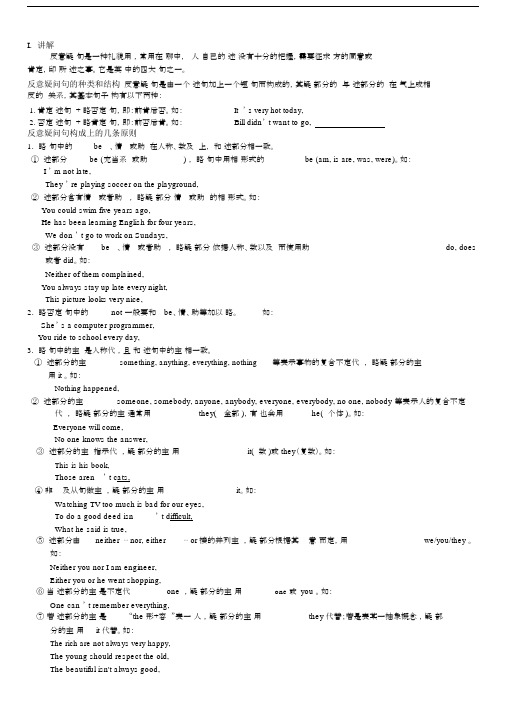
I.讲解反意疑句是一种礼貌用,常用在聊中,人自己的述没有十分的把握,需要征求方的同意或肯定,印所述之事。
它是英中的四大句之一。
反意疑问句的种类和结构反意疑句是由一个述句加上一个短句而构成的,其疑部分的与述部分的在气上成相反的关系,其基本句子构有以下两种:1.肯定述句 +略否定句,即:前肯后否。
如:It ’ s very hot today,________________2.否定述句 +略肯定句,即:前否后肯。
如:Bill didn’ t want to go,反意疑问句构成上的几条原则1. 略句中的be 、情或助在人称、数及上,和述部分相一致。
①述部分be (充当系或助),略句中用相形式的be (am, is are, was, were)。
如:I ’ m not late, ________________They ’ re playing soccer on the playground, ________________② 述部分含有情或者助,略疑部分情或助的相形式。
如:You could swim five years ago, ________________He has been learning English for four years, ________________We don ’ t go to work on Sundays,________________③述部分没有be 、情或者助,略疑部分依据人称、数以及而使用助或者 did。
如:Neither of them complained, ________________You always stay up late every night, ________________This picture looks very nice, ________________2. 略否定句中的not 一般要和be、情、助等加以略。
初高中反义疑问句详解
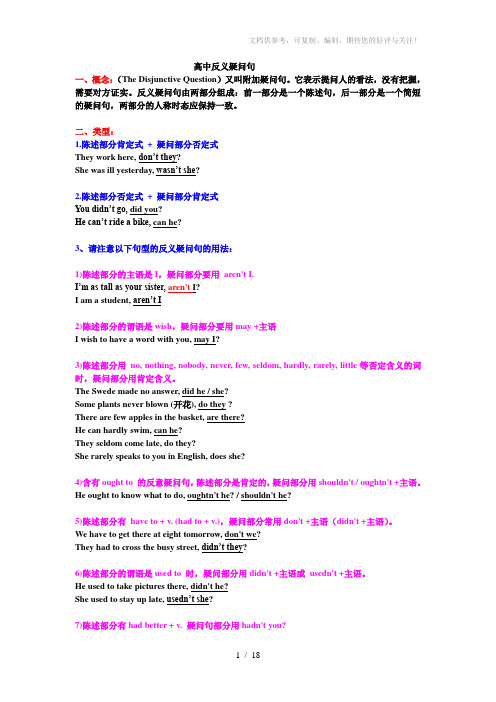
高中反义疑问句一、概念:(The Disjunctive Question)又叫附加疑问句。
它表示提问人的看法,没有把握,需要对方证实。
反义疑问句由两部分组成:前一部分是一个陈述句,后一部分是一个简短的疑问句,两部分的人称时态应保持一致。
二、类型:1.陈述部分肯定式+ 疑问部分否定式They work here, don’t they?She was ill yesterday, wasn’t she?2.陈述部分否定式+ 疑问部分肯定式You didn’t go, did you?He can’t ride a bike, can he?3、请注意以下句型的反义疑问句的用法:1)陈述部分的主语是I,疑问部分要用aren't I.I’m as tall as your sister, aren't I?I am a student, aren’t I2)陈述部分的谓语是wish,疑问部分要用may +主语I wish to have a word with you, may I?3)陈述部分用no, nothing, nobody, never, few, seldom, hardly, rarely, little等否定含义的词时,疑问部分用肯定含义。
The Swede made no answer, did he / she?Some plants never blown (开花), do they ?There are few apples in the basket, are there?He can hardly swim, can he?They seldom come late, do they?She rarely speaks to you in English, does she?4)含有ought to 的反意疑问句,陈述部分是肯定的,疑问部分用shouldn't / oughtn't +主语。
- 1、下载文档前请自行甄别文档内容的完整性,平台不提供额外的编辑、内容补充、找答案等附加服务。
- 2、"仅部分预览"的文档,不可在线预览部分如存在完整性等问题,可反馈申请退款(可完整预览的文档不适用该条件!)。
- 3、如文档侵犯您的权益,请联系客服反馈,我们会尽快为您处理(人工客服工作时间:9:00-18:30)。
does he Carol: Oh, yes. He doesn’t like talking too much,(3)__________? Eric: No, he is very quiet. Who is the slim young lady? She looks doesn’t she pretty,(4)_______________? Carol: You mean the one sitting in the chair reading? I think she’s Ellen, Mum’s best friend. The man beside her is Dave. They’re married now,(5)______________? aren’t they Eric: Yes. Are they coming to spend their summer holiday here as usual? Carol: Yes, but they didn’t come last summer. Dave has really changed a lot. He’s put on a lot of weight. You can hardly recognize him in the can you photo,(6)____________? Eric: Everyone in the picture seems to have put on some don’t they weight,(7)_____________? Carol: That’s the interesting thing about old photos---you can always see how much time has passed since they were taken,(8)____________? can’t you Eric: Exactly!
It’s a lovely day, isn’t it?
2 To request information in a more polite way Neither of you has heard the news, have you?
3 To soften an order or a request for someone to do something
______________?
Eric: Yeah. He went there last month. Oh, I know who the boy is. Carol: Which boy? The taller one? Eric: No. The one who is standing with Mum and Dad. He’s our cousin Rob.
(1)Close the window, will you?
(2)Let’s have a rest, shall we?
exercises
Read the following dialogue and complete it with the correct question tag.
Eric: Carol, come and look at this old photo. Look, this is Mum and this is Dad. But I don’t know anyone else in the photo. You know who they are, (1)__________ ? Carol: Let me have a look. Wow! That’s Uncle Sam. He looks really young in this photo. Now he’s in Paris,(2)
Little?
Neither of you will have coffee, will you?
She seldom argues with people, does she?
There are a group of little children in the museum, aren’t they?
Unit 3 Grammar & usage
主讲人:
Question Tags (反义疑问句)
D tags are short questions that come at the end of statements.
1 To start a conversation
(1)You wouldn’t take these pills, would you? (2)His father can’t swim, can he? (3)Everyone has advised you not to go on a diet, haven’t they?
4 We use an auxiliary verb(助动词), modal verb(情态动词) or be in a question tag.
(1)You like travelling, don’t you? (2)There is something wrong, isn’t it? (3)You can’t speak Italian, can you?
5 After an imperative clause(祈使句), we use will you. After Let’s, we use shall we.
Tip:When the main clause uses
little to mean small or young, it is considered positive.
3 We use a personal pronoun like I, we, you, he, she, it or they in a question tag.
confirmation
Grammar points
1 At the end of a positive statement, we use a negative question tag. At the end of a negative statement, we use a positive question tag. We can still be friends, can’t we?
1 Finish the exercises of part B on Page 51 2 Review the Task.
He doesn’t like ice cream, does he?
2 When the main clause uses words like neither, none, nobody, nothing, few, little, never, hardly or seldom, it is considered negative. It is, therefore, followed by a positive question tag.
Carol: Oh, yes. He doesn’t like talking too much,(3)__________? Eric: No, he is very quiet. Who is the slim young lady? She looks pretty,(4)_______________? Carol: You mean the one sitting in the chair reading? I think she’s Ellen, Mum’s best friend. The man beside her is Dave. They’re married now,(5)______________? Eric: Yes. Are they coming to spend their summer holiday here as usual? Carol: Yes, but they didn’t come last summer. Dave has really changed a lot. He’s put on a lot of weight. You can hardly recognize him in the photo,(6)____________? Eric: Everyone in the picture seems to have put on some weight,(7)_____________? Carol: That’s the interesting thing about old photos---you can always see how much time has passed since they were taken,(8)____________? Eric: Exactly!
Close the window, will you?
4 To ask for agreement or confirmation
agreemen t
You are a high school student, aren’t you? You are a high school student, aren’t you?
exercises
Read the following dialogue and complete it with the correct question tag.
Eric: Carol, come and look at this old photo. Look, this is Mum and this is Dad. But I don’t know anyone else in the don’t you photo. You know who they are, (1)__________ ? Carol: Let me have a look. Wow! That’s Uncle Sam. He looks really young in this photo. Now he’s in Paris,(2) isn’t he ______________? Eric: Yeah. He went there last month. Oh, I know who the boy is. Carol: Which boy? The taller one? Eric: No. The one who is standing with Mum and Dad. He’s our cousin Rob.
